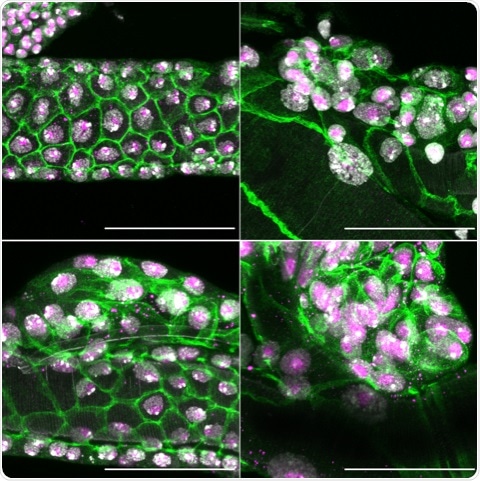Even the larvae of the Drosophila fly contain adult progenitor cells. And these cells are the only ones that are preserved throughout the growth and are responsible for the development of adult tissues and organs.

Tracheal cells of Drosophila larvae, destined to form the adult tissue structures. Image Credit: Giannios, IRB Barcelona.
Led by IBMB-CSIC researcher Jordi Casanova, the Development and Morphogenesis in the Drosophila laboratory at IRB Barcelona has detected the headcase (hdc) gene that is responsible for the distinctive features of these adult progenitor cells.
In our study, mainly using the powerful genetic tools available in Drosophila, we were able to show that this gene regulates the development of the organism, including the stages of metamorphosis, by controlling the growth, proliferation, survival and resistance to stress of adult progenitor cells.”
Jordi Casanova, IBMB-CSIC Researcher, Development and Morphogenesis in Drosophila lab, Institute for Research in Biomedicine
Homologous to the human HECA gene, the headcase gene plays a crucial role in cancer, behaving as a tumor suppressor in both organisms as it delays the cell cycle.
The link between stress and cancer
In addition to defining the headcase as an important gene for adult progenitor cells, the Casanova-led team has also defined its modes of action. Apart from its role in hormone-stimulated growth regulation, the headcase gene also contributes to the stress response and ensures a balance between these two mechanisms.
The finding that the headcase gene confers stress protection opens up a new avenue to be explored regarding the role of human HECA as it could also act as a stress protector and its absence may induce stress conditions that favor the initiation and progression of cancer.”
Panagiotis Giannios, Study First Author and Postdoctoral Researcher, Institute for Research in Biomedicine, Barcelona
Source:
Journal reference:
Giannios, P & Casanova, J (2021) Systemic and local effect of the Drosophila headcase gene and its role in stress protection of Adult Progenitor Cells. PLOS Genetics. doi.org/10.1371/journal.pgen.1009362.